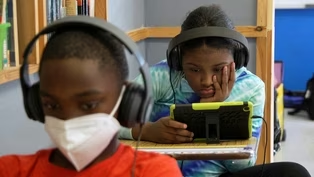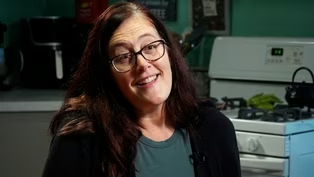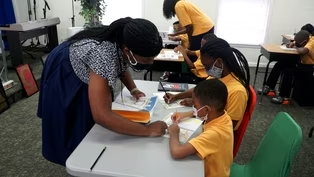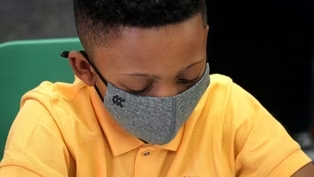
COVID-19 Learning Loss
2/11/2022 | 27m 29sVideo has Closed Captions
School closings and remote learning have led to significant learning loss for students.
Following a year of school closings and virtual learning due to the COVID-19 pandemic, more than half of K-12 teachers say students experienced significant learning loss as a result of the pandemic. ncIMPACT explores what’s being done to help students get back on track.
Problems playing video? | Closed Captioning Feedback
Problems playing video? | Closed Captioning Feedback
ncIMPACT is a local public television program presented by PBS NC

COVID-19 Learning Loss
2/11/2022 | 27m 29sVideo has Closed Captions
Following a year of school closings and virtual learning due to the COVID-19 pandemic, more than half of K-12 teachers say students experienced significant learning loss as a result of the pandemic. ncIMPACT explores what’s being done to help students get back on track.
Problems playing video? | Closed Captioning Feedback
How to Watch ncIMPACT
ncIMPACT is available to stream on pbs.org and the free PBS App, available on iPhone, Apple TV, Android TV, Android smartphones, Amazon Fire TV, Amazon Fire Tablet, Roku, Samsung Smart TV, and Vizio.
Providing Support for PBS.org
Learn Moreabout PBS online sponsorship- Coming up on NC Impact.
- And right now the grade levels are so low.
Our kids are a year behind.
- COVID 19 school closings and distance learning have led to significant learning loss for some students.
How communities are helping those students get back on track.
- ncIMPACT is a PBS North Carolina production in association with the University of North Carolina School of Government.
Funding for ncIMPACT is made possible by - Changing the course of people's lives.
That's the impact UNC Health and the UNC School of Medicine work to deliver every day.
Our 40,000 team members across the state of North Carolina are committed to caring for you, our patients and communities, as well as educating the next generation of healthcare professionals.
Individually, we can do a little, but collectively we can do a lot to create impact.
- Hello, and welcome to ncIMPACT.
I'm Anita Brown-Graham.
2020, 21 will be remembered as one of the most difficult school years ever for students and their teachers and parents.
We all knew students were falling behind last year, but now we have a better idea of how much learning was actually lost.
Data from the consulting firm McKinsey.
shows that by the end of the 2020-2021 school year, students were on average five months behind in math and four months behind in reading.
The pandemic also widened opportunity and achievement gaps.
ncIMPACT Evan Howell introduces us to a Greensboro woman who spent all of last year pulling double duty as a teacher and a mom.
- It was at home during the pandemic where Amy Schenck learned to juggle.
- It was near impossible to do it all and cried a lot.
[laughs] - As both teacher and parent, she struggled to ensure her students were thriving, but also had the double duty of making sure her own children remain engaged.
- I was just trying to manage, figure out how to teach and be a parent and make sure they were doing, we were all doing what we were supposed to do.
- Schenck says the lack of guidance from the school district was simply a symptom of the fact that online learning was new and that no one was sure how to adapt.
- I felt like I failed every day, last year as a teacher, because I, I sometimes would have 12 students on sometimes I'd have three.
- Schenck says for their protection her school district didn't require students to keep their cameras on, but that had the added effect of letting students tune out.
- By like second and third quarter, they were just giving us like passing grades on everything, 'cause nobody would was, there was like nobody getting it all done.
- Schenck says her children were essentially being asked to manage their own education.
And without face-to-face engagement, students were falling behind.
- Teachers feed off the energy of the kids in the room.
And I didn't have that.
- Students like eight year old Kinsey Schenck tried her best, but her mom says without active participation from parents at home, younger students in particular were at risk.
- There's some gaps that I did not see with my son when he was her age because he was in school.
So we're, we're working on that.
We have to do some extra supports this year to, to get her up to speed.
- All right, so the first thing.
- At the end of the day, Schenck agrees there was learning that was lost in the classroom, but believes families should look at the silver lining.
- There's so much more that they did learn about the world.
And I was very frustrated that the emphasis was just on the learning loss and not on the things that they did gain.
- Schenck says educators and parents should take some lessons from the pandemic and steer education priorities to where they need to go.
If they don't she says, kids may just wind up back at home again, trying to get an education.
For ncIMPACT, I'm Evan Howell.
- Joining me now is Cassandra Davis, a research associate professor with the Department of Public Policy at UNC Chapel Hill.
Cassandra, there may be people watching this program who are thinking a few months of learning loss can't be such a big deal.
Why is this issue important and what kind of long term consequences do we need to look for?
- Thank you so much for having me.
So just really quickly, if we were thinking about learning loss in terms of just one isolated incident and for affluent families, then chances are, you know, students would be able to bounce back.
They're absolutely resilient in that matter.
But for this case for a nation, for our state, for certain regions, that's not what we're talking about.
We're talking about long-term disruptions to schooling.
This, what the research tells us and what the data suggests is that this disproportionately impacts students of color as well as students that are part of or attending low wealth, high poverty schools.
This, these months turns into combined months, which then ultimately impact graduation rates, the ability to even graduate and then attend post-secondary schooling.
So this absolutely impacts our students and it impacts them in different ways.
- What are the ways that we assess learning loss?
- So the ways that we, there's different ways that we do that.
We're looking at, typically when we're hearing about learning loss, we're hearing about differences in a student achievement to the testing, the testing scores have changed.
Part of that video that you just showed earlier, which was very emotional, but it really speaks to the, the topic that schooling is much bigger than testing, right?
That, that looking at how a student has progressed can be measured in greater spacess than just looking at a math score or an English score.
- So the McKinsey study looks at math and reading and it also, to be fair, says the quality of remote learning mattered.
So for students who were doing distance learning that was high quality, they may not have lost as much as other students.
It points out that learning loss has hit historically disadvantaged students disproportionately.
Help us understand what that means going forward, particularly in a state that has determined we wanna have more educated people with post-secondary degrees by the end of this decade.
- Right, so I think a couple pieces to, to that point, the, the idea, I, I definitely agree with what the, the study shared, but there's also this, this, this piece of kind of proxy educators that students that are, have access to high quality virtual learning potentially also have access to high quality resources, have access to a parent or guardians that are, are more knowledgeable about the, in it, about the necessary tools that are needed for students.
So it's not just a, a kind of cut and dry as in just because we have great virtual resources, that means our students are doing well.
There's other factors at play here.
But to your point, there was some other data that talked about the missing students, a number of students that stopped showing up for schools.
And we know that as a state, our state is incredibly diverse.
We have students that are identify as American Indian, large populations throughout our state.
And we also have Latinx, pockets of Latinx students, black students, white students, just different, Hmong population.
There's a variety of students.
And so we're seeing that this impact and the ways that they're receiving resources or access to information is absolutely different from our high wealth students.
- Thank you.
I appreciate that.
And it tells us we've gotta keep looking at this data in a disaggregated way.
- Absolutely.
- Early reports are showing that reading skills among young students stalled during the pandemic.
Alamance Achieves is a community driven initiative in Alamance County.
They've been focusing on improving basic reading skills lost during the pandemic.
ncIMPACT David Hurst joins us with their progress.
David.
- Anita, I had a chance to visit a school in Alamance County and teachers there told me the literacy rates have dropped pretty significantly during the pandemic, but there's an organization that's seeing positive results in improving students' reading skills.
It's called Alamance Achieves They bring together stakeholders from different sectors around the community, all with one goal in mind , to improve children's success from cradle to career.
- When you complete it.
- When Vanessa Diggs came out of retirement to return to teaching, she had no idea the setbacks her students would face as a result of COVID 19.
- I think we all experienced those periods of hopelessness.
How are we gonna get 'em back, you know.
That was the big question.
Cameron, you're complete.
- Diggs is a teacher, an educational consultant at the Positive Day School in Burlington.
She says, when looking at test scores from last year compared to the year before, the learning loss was evident.
- I think our kids stayed home.
Many of them went through situations where they shouldn't have.
Left alone, that they came back with some scars.
- With help from Alamance Achieves, Positive Day School launched a literacy lab and implemented a program called BookNook.
BookNook is a digital learning platform that provides reading support through lessons, games, and assessments.
- A lot of times, kids that come to you and they feel like they can't do it.
I can't, or I don't know how, or I can't read that, but once they get on BookNook and they put on those headphones, it's just putting them in another world.
- You ready to move on?
- These reading initiatives have helped students gain back some of the basic readings skills lost while schools were closed.
- What's the last sentence?
- They also incorporate aspects of social and emotional learning as students pick an emoji before each session to indicate how they're feeling.
- We are talking to our individual partners about how can we take this emoji of how student feels before the session and after the session and go a little bit deeper about supporting their wellness at the same time that we're supporting, you know, this kind of boost of literacy resources.
- Positive Day School is just one partner of the Alamance Achieves initiative.
The organization came together in 2015 to improve educational outcomes in Alamance County.
County leaders realized that education is not just a responsibility of the local school system, but also the whole community.
- How do we begin to dismantle systems in order to create opportunity?
And we've talked about the widening of the academic gap, and there's also an opportunity gap.
So what do we as a community do to change that?
- But now we know to.
- And since they already had a strong collaborative framework in place, Alamance Achieves was quickly able to respond and create virtual classroom hubs when schools shut down at the peak of the pandemic.
- And I think that really showed what we can do when as a community we align and we recognize that there's a need in community, but when we come together to problem solve and pool our resources that, you know, we can actually make something happen in community that centers and supports our students.
- But I can tell when you're completed, because it tells me guys.
- For Vanessa Diggs, she says, there's still a lot of work to be done, but each step of progress and each small win with her students helps restore a piece of hope for the future.
- We've had so much loss and, and we talked about loss so much that we almost forgot that there is hope and that we can get our kids back, that, that we, our kids are, are resilient.
And if we give them the right tools and if we come in and if we have the attitude of hope, they feel that, they believe it, and it happens.
- Alamance Achieves says they are focusing on an equitable recovery from COVID 19 learning loss.
They're receiving support from Strive Together, a national network that brings communities together around data to make decisions.
Alamance Achieves joins 50 other communities across 26 states in this network to deliver more equitable outcomes for children and their families.
And Alamance Achieves tells me they recognize the importance of collaboration and they're leaning into national network in order to get that done.
- We won't have recovery without this kind of community collaboration.
Thank you, David.
Joining me now is Michael Mayer, executive director of the North Carolina Department of Public Instructions, Office of Learning Recovery and Acceleration.
Michael, I'm excited to know that there is such an office at DPI.
We just saw community-based solution for helping students recover from the pandemic.
Give us a quick snapshot of what's happening at the statewide level.
- Sure.
First, thank you for having me today, Anita.
It's good to see you.
- It's great to see you, you know, we're in the midst of this, you know, now going on two year pandemic and, and I was hired back in March of 2021 by Superintendent Truitt to oversee the learning recovery work that's happening.
As a department of public instruction, we've had, you know, an unprecedented influx of federal funding come in and, and we have an obligation to ensure that we are using that money wisely, right?
And so, so part of our work is to develop a comprehensive strategy for recovery for students throughout this state.
So we're focused on three big things.
So the first certainly is research and evaluation, trying to get a handle on really what has been the both academic and social, emotional impact the pandemic has had on children.
And, and we're excited that in March we'll release the first comprehensive study of, of lost instructional time for students in North Carolina.
We tend to use the term lost instructional time.
So, so yeah, so we're focused on both academic and social emotional outcomes.
We're also focused on developing some comprehensive statewide strategies through school extension programming.
So that's summer and after school enrichment.
And then thirdly, we're focused on providing direct support to public school units throughout the state of North Carolina.
- You saw in the first story, some concerns that some students have been disproportionately impacted.
What are some of the ways that your office is seeking to ensure a full recovery?
And that though most impacted will get the help they need.
- Yeah, so, so certainly when we think about the, the McKinsey study, for example, that, that just came out, that of course is national data.
They reported some North Carolina results and that really is just a small set of their overall results.
What, what we are getting ready to release is a far more comprehensive look, right?
So, so when we think about disproportionality in students who have been impacted.
We're gonna have data for students from all of the different demographic groups represented in North Carolina, including right, Asian students, Hispanic students, students of color.
But additionally, we're actually going even deeper in looking at students who perhaps we don't always get a picture of students who are experiencing homelessness, justice involved students, military connected students, right?
So thinking about what, what has been the toll on all of these different students throughout the state, a really important part of our work and, and trying to identify that disproportionate impact as you noted, which is really important because we're not only thinking about the, the lost instructional time as a result of the pandemic, but we've got longstanding academic disparities that, that are only exacerbated by this pandemic.
And so it's important that we're providing resources to students that, that really need it the most.
- Michael, your office gives us hope.
Thank you.
For some students, learning wasn't the only thing lost during the pandemic.
Some lost family members or friends, others had caregivers lose their jobs and almost all students experience some form of social isolation.
It's why one small school in Craven County is keeping trauma in mind while bouncing back or as Melody Hunter-Pillion reports, they're bouncing forward.
Melody, tell us what you learned from this school.
- Anita, in a nutshell, this school was prepared for trauma.
Peletah Academic Center for Excellence or PACE, is based in New Bern.
Their community had endured devastating losses from hurricanes, including Florence in 2018.
So they incorporated coping and responding to trauma into their school week, along with their robust academic structure.
- When COVID hit, PACE and its students were already in a mode for dealing with this specific trauma head on.
Resilience became the order of the day in their weekly bounce forward zone.
- Today is a new day.
- Today is a new day.
- Whether in person or virtual, these students in New Bern, North Carolina begin the day with positive affirmations.
- And we all have to be in step.
- A private religious school, Peletah Academic Center for Excellence, or PACE, recognized the COVID pandemic like any crisis, would impact students and their ability to learn.
- When COVID happened and we closed on March the 13th, 2020, and everything changed life for us, our scholars, it changed.
- You can go ahead and get started as I talk you through it, okay.
- Parents and students across the state in private and public schools faced another dilemma, the uncharted territory of virtual learning.
- I didn't know how long it was gonna go on.
I just like, you know, I just really hoping that I could get back to school, you know, see my friends.
- What does it mean to be resilient?
- Because PACE already embraced trauma informed education, when COVID hit, the school made the same pivot they did after hurricanes and other crises the community had weathered in the past.
With input from parents, social workers and school administrators, they looked ahead, creating a bounce forward zone.
- Is a simpler term for a word that starts with an R. Who can tell me what it means?
- To be able to share how they were feeling, if they felt comfortable or that they were given opportunities to draw, they used their hands with Play-Doh to make different things.
They were able to learn those breathing skills and to learn those techniques of coping, even when things are difficult and hard to understand.
- Is it something that you wanna learn how to do.
- And school administrators say students end of grade test scores reflected their resilience, meeting or exceeding grade level.
- As difficult and as challenging as this time is, it's also an opportunity for character development.
And we are seeing that with our scholars.
- Trouble doesn't last always, it's gonna pass, but they just have to understand that you just have to work through and find those methods and whatever can help you get through it and bounce back.
- The bounce forward zone does not take the place of schoolwork.
It complements learning.
The trauma informed learning framework netted success on test scores.
As a matter of fact, PACE reported students testing at or above grade level and they're first to integrate testing during COVID.
- That is wonderful.
Thank you, Melody.
Let's bring back in our wonderful panelists.
Joining us for our ncIMPACT Roundtable is John-Paul Smith, the executive director of the North Carolina Educational Core.
John-Paul, we'll start with you.
We've talked a lot about the impact of the pandemic on students, but this pandemic also negatively impacted teachers and other school staff.
We know they're gonna have to play a critical role in recovering from lost instructional time.
How can we support them?
- Thank you, Anita.
It's good to be with, with you.
It's an honor to be with you and Michael and Cassandra.
You know, what we've heard from teachers is that they feel like first responders.
So along with families, they're first responders to this pandemic and they are feeling RAMmed when they need to feel they need open arms.
So there's some acronyms in here.
The RAM is, R is responsible.
They feel responsible for helping kids recover from this unfinished learning.
A is they're feeling really anxious.
There's a lot on their plate.
We just heard from Mrs. Schenck about how stressed she's feeling, and then M is measured and maligned.
So they feel like they are the ones who are gonna be held accountable to the grade scores at the end of the year and they need support.
And so what they need is they need open arms.
And this is what we're hearing all across the state.
They need acknowledgement that how difficult the job is that they're doing.
They need to feel some grace.
And then R, they're also asking for research-backed ways to really address student learning.
They wanna, they're working really hard.
They wanna work smarter, not harder, and they want to know what are the best ways that we can help progress interventions and remediation when that is needed.
And they need help to be able to figure those things out 'cause they don't have all the time in the world.
And that's the last thing.
They need more manpower.
And, and basically what I mean by that is the, the most limited resource that teachers have is their own time.
And what we know works in terms of student learning recovery is personalized, targeted instruction and teachers don't have all the time in the world to be able to, to provide that.
So what they need is additional hands to help support them, extend their reach and support students in their recovery.
- Michael, how have students demonstrated in your opinion, resilience during this pandemic and what, what skills?
We've heard that there have been positives.
Be more specific, like what skills have they gained that might make them even better students in the future?
- So, so certainly I think one of the things that, that we should do is really take a look at both.
You know, there, there certainly have been negative consequences to the, to the pandemic, but, but there are certainly positives that have resulted as you've said.
And so I think specifically we probably should look at things like time management.
I, I know I, I have a high schooler myself who, who became very adept at managing her own time and, and getting to her, her online class right in the nick of time and, and ensuring that she was finishing her work and, and giving herself some time.
And I know students across the state were able to do that.
You know, one of the things that I think we probably haven't talked enough about is students being involved or taking charge of their own learning, right.
Far too often, students are, are not directly responsible for their own learning.
And we've given them an opportunity really to take charge and thinking about different ways of learning.
So, so certainly having a chance now to explore some of the different things that they might certainly be good at, that they wouldn't have known prior to this pandemic.
And so managing their own learning, I think is a huge piece of that.
That of course suggests that we now have to be open to their continued management of their learning.
And going back to the way things used to be may not work for them or for us.
- Yeah, certainly.
So, you know, one of the investments that, that we are gonna have an opportunity to pursue is a competency based learning platform, which could provide real time data back to teachers as, as John-Paul mentioned earlier, right?
Having teachers work smarter, not harder.
And so helping them really target where students need support and then using a platform like that to not only provide some remediation, but really to accelerate students who, who are doing well in other areas.
And so thinking about some of these kind of longstanding disparities we have, how do we really push kids forward now and, and use some of the funding and some of the programming and, and some of these other opportunities that now present themselves to us in really positive, productive ways.
- Silver lining.
So let me ask you, John-Paul, a related question.
What do you see coming out of this pandemic that you think may make education better?
- So I think that we are gonna come out stronger.
And I think about just North Carolinians in general.
North Carolinians are resilient people.
We just heard about bouncing forward.
And if we think back on our history, every generation has this generational moment that they're asked to rise.
And that's what North Carolinians do.
You know, during the depression, the depression area generation ,businesses are failing and banks, banks closed.
And then we saw the blue Ridge Parkway emerge.
And then with the World War II generation, that generation went and fought to defend freedom abroad.
And then we came to build a stronger North Carolina here.
We built the UNC system.
We built the community college system.
We built the public health system.
And I think we're gonna gonna see a lot of strength come out of this.
COVID is our generational moment.
And everyone who's stepping up to support teachers and students in this moment is part of this new generation of leaders who's really gonna build a stronger North Carolina and a part of that is engaging the entire community to get behind our teachers and to get behind our students, to really elevate their success.
- Thank you all for the words of hope amidst a very complex and troubling situation.
I really appreciate your work on this topic and appreciate you joining us today to share your thoughts.
And thank you for watching and engaging.
There are solutions out there if we work together.
Tell us what your community is doing or how we can help you.
You may email us at NCimpact@unc.edu, or message us on Twitter or Facebook, and be sure to join us every Friday night at 7:30 on PBS North Carolina for new episodes of ncIMPACT.
Coming up on ncIMPACT.
- We've got a black eye and people see that and they, you know, they think maybe that's not what I want to do after all.
- Nearly all law enforcement agencies are dealing with an officer shortage.
How a new generation of officers is making a difference.
[energetic music] - ncIMPACT is a PBS North Carolina production in association with the University of North Carolina School of Government.
Funding for ncIMPACT is made possible by.
- Changing the course of people's lives.
That's the impact UNC Health and the UNC School of Medicine work to deliver every day.
Our 40,000 team members across the state of North Carolina are committed to caring for you, our patients and communities, as well as educating the next generation of healthcare professionals.
Individually, we can do a little, but collectively we can do a lot to create impact.
Alamance Achieves tackles COVID-19 learning loss
Video has Closed Captions
Clip: 2/11/2022 | 3m 31s | A program in Alamance County is improving literacy skills lost during the pandemic. (3m 31s)
NC teacher forced to juggle during the pandemic
Video has Closed Captions
Clip: 2/11/2022 | 2m 29s | Amy Schenck struggled with double duty as a teacher and mom during the COVID-19 pandemic. (2m 29s)
New Bern school ‘bounces forward’ after COVID-19 pandemic
Video has Closed Captions
Clip: 2/11/2022 | 2m 19s | New Bern school works to recover from the pandemic by implementing “Bounce Forward Zone.” (2m 19s)
Preview | COVID-19 Learning Loss
Preview: 2/11/2022 | 20s | School closings and remote learning have led to significant learning loss for students. (20s)
Providing Support for PBS.org
Learn Moreabout PBS online sponsorship
- News and Public Affairs

Top journalists deliver compelling original analysis of the hour's headlines.

- News and Public Affairs

FRONTLINE is investigative journalism that questions, explains and changes our world.
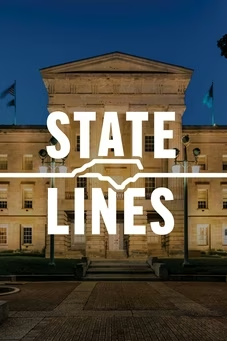











Support for PBS provided by:
ncIMPACT is a local public television program presented by PBS NC
